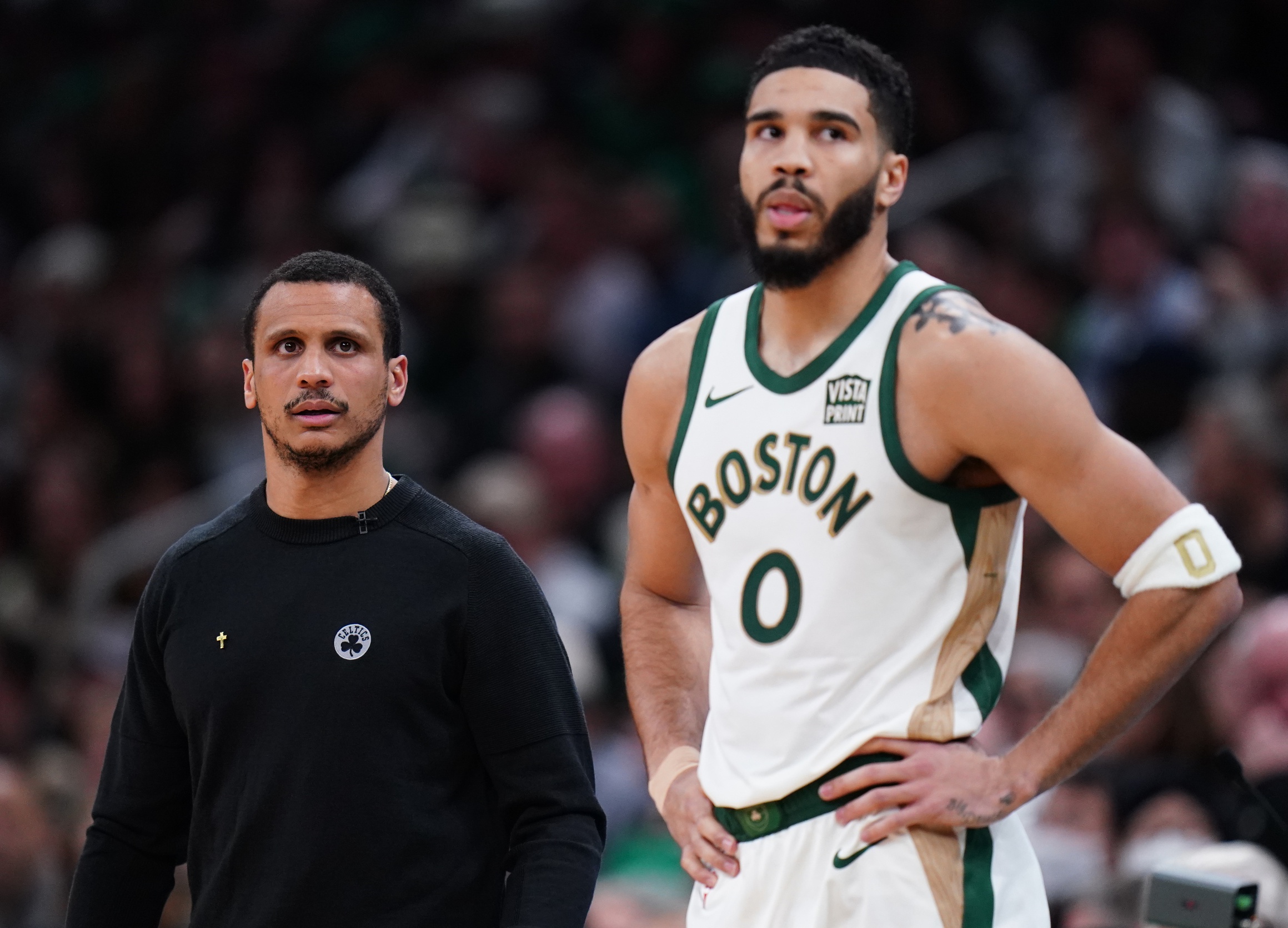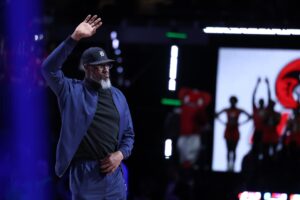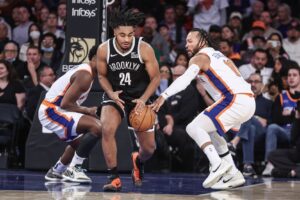The Celtics followed up an incredible 11-game win streak by dropping back-to-back games for the first time since November. Including a blown 22-point lead in the 4th quarter against the Cavs on Tuesday and a lackluster performance against the Nuggets on Thursday. These back-to-back losses tell us a lot about the Celtics. Let’s break down what we learned from these games.
3 Takeaways From The Celtics Recent Losses
Clutch Time Issues
Clutch time play is a consistent concern with the Celtics. Despite noticeable improvements and taking care of business in clutch time during their 11-game win streak the end of the Cavs game was a disaster. With a 93-71 advantage with nine minutes left, this game should have been a sealed deal for the Celtics. Instead, the Cavs outscored the Celtics 34-11 in the final nine minutes. This set the franchise record for the largest blown 4th quarter lead since 1997. Furthermore, the Cavs were playing without Donovan Mitchell or Evan Mobley making Boston’s collapse even worse.
LARGEST BLOWN 4TH QUARTER LEADS BY CELTICS
22 Tonight at Cleveland, Lost by 1
19 Nov. 14, 2014 vs Cleveland, Lost by 1
19 Nov. 11, 2006 at Cleveland, Lost by 1
18 Mar. 23, 2019 at Charlotte, Lost by 7
18 Mar. 3, 2020 vs Brooklyn, Lost by 9
(Since 1996-97)— Dick Lipe (@DickLipe) March 6, 2024
This collapse happened for the Celtics on both ends of the floor. Offensively the Celtics went ice cold going 0-8 from beyond the arc. Everyone outside of Kristaps Porzingis couldn’t find quality looks at the rim or from the mid-range area making it impossible to overcome the abysmal shooting. Furthermore, the Celtics’ inability to generate rim pressure and get to the free-throw line was a massive factor. Defensively the Celtics rotations and closeouts were beyond sloppy. Dean Wade poured in five three-pointers and 20 points in the 4th quarter. While Wade hit a couple of difficult shots in this incredible performance the Celtics defense continuously gave him open looks and were delayed closing him out. Joe Mazzulla also controversially held onto a timeout with the game on the line. Ultimately this loss shows us that closing games is still a major concern for the Celtics.
The Celtics Must Adapt To Different Styles
While a lot can be learned from the Nuggets game the most impactful takeaway is the Celtics failed to adapt their style. This was on full display in both games against the Nuggets this year. Both games were grinded out defensive games with shooting struggles from both teams. This style of game has been challenged the Celtics for years. The Nuggets swept the series despite shooting 25% and 19% from three. The Celtics weren’t much better shooting 31% and 28% from beyond the arc. Denver’s suffocating physical defense forced the Celtics into bad shots and turnovers.
Despite a brilliant 41-point performance from Jaylen Brown the rest of the Celtics’ starters were largely ineffective scoring the ball. Jayson Tatum’s lack of aggression and scoring was perhaps the biggest issue. Overall the Celtics offense outside of Brown was lackluster and they failed to consistently find high-percentage shots. Nikola Jokic dominated from the post and generated easy looks throughout the game. Aaron Gordon also found consistent open looks at the dunker spot due to Boston’s poor rotations and defensive awareness.
The difference between the Celtics and Nuggets in clutch situations:
Denver has a formulaic approach to creating advantages and they’re guaranteed a good shot every trip down the floor. Boston seems haphazard in their approach, often settling for looks. pic.twitter.com/XhkemMOf8K
— Esfandiar Baraheni (@JustEsBaraheni) March 8, 2024
The game showed a contrast between the two title favorites. The Nuggets were able to overcome poor shooting and still found great looks shots all while playing physically imposing defense. Whereas the Celtics had no consistent scoring outside of Brown and questionable defensive effort at times. In short, the Nuggets were able to adapt while the Celtics failed to adapt to this style. In a playoff-style game the Nuggets championship experience was on full display. This should serve as a reminder the road for a title still goes through Denver.
The Celtics Need Superstar Tatum
Tatum was incredible throughout the Celtics 11 game-win streak. Averaging 28 ppg, 8.5 rpg and 6.5 apg during the stretch. Tatum found the perfect balance of taking over games and making a well-rounded impact. His play and the Celtics’ level of dominance put Tatum somewhere within MVP conversations. However, in both the Cavs and Nuggets games Tatum was underwhelming, to say the least. Tatum was 0-9 in the 4th quarter of the Cavs game. This included a difficult mid-range attempt with 2 seconds left which was later called an offensive foul sealing a loss for the Celtics.
Against the Nuggets Tatum got off to a hot start but completely disappeared down the stretch. Tatum scored just seven points in the second half while shooting 2-7 from the field and 0-2 from three. Tatum couldn’t take advantage of the non-Jokic minutes in the late 3rd quarter and early 4th. He struggled to be aggressive against a lineup with Jamal Murray and 4 Nuggets bench players. Having your star disappear and losing the non-Jokic minutes is a recipe for disaster against the Nuggets. Despite the Celtics’ well-rounded talent they clearly need Tatum to play like a superstar to be at their best. Come playoff time an aggressive yet efficient Tatum will be necessary to have true success.
The Last Word
To be clear these recent two losses shouldn’t make fans panic. The Celtics are less than a week removed from an absurd 11-game win streak and still hold a dominant 7.5-game advantage above the 2-seed. During that win streak, the Celtics had the best point differential over a winning streak of 10 games or more of all time. They also became the first team ever to have three 50-point wins in a single season. This included a dominant 52-point blowout against the Warriors. In the big picture, the Celtics are an elite team and still top contenders. However, these recent losses highlight underlying concerns with the team. These issues can’t happen consistently, especially in the playoffs. Ultimately adapting to different styles, closing out games, and stars playing at an elite level will be crucial for Boston’s regular season success to fully translate in the playoffs.






